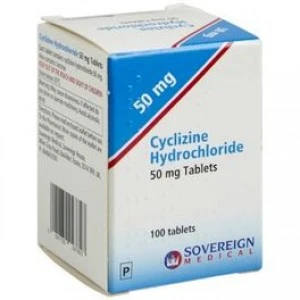Nausea
Nausea is an uncomfortable feeling of sickness, often accompanied by a gurgling or swirling sensation in the stomach. This condition is often mild and clears up on its own, but it can be triggered by medication, which may be necessary for your health.
Cyclizine
- Prevents nausea
- Stops vomiting
- Sent from a registered pharmacy
What is nausea?
Nausea is a general feeling of sickness or queasiness which can affect anybody. It can be a condition in and of itself or be accompanied by other symptoms such as vomiting, diarrhoea, headache, dry mouth, pale complexion, dizziness, clamminess or chills.
The mechanism of nausea, specifically the biological functions that cause nausea, is not fully understood. However, it is believed that several pathways are activated, which can result in the sensation of nausea or induce vomiting. These pathways include the central nervous system, the chemoreceptor trigger zone (also known as the vomiting centre of the brain), the vestibular apparatus in the inner ear, and peripheral pathways surrounding the gastrointestinal tract.
For some, nausea is mild and goes away on its own. Other people may experience frequent or severe nausea. The severity and duration of nausea depend on a person's sensitivity and underlying condition.
While the feeling of nausea can subside on its own, it can sometimes lead to vomiting. Being sick can relieve nausea, but it should not be induced through food, medicine, or manual stimulation of the gag reflex without strict guidance from a healthcare professional. Inducing vomiting can seriously damage your throat and lead to further complications.
If your nausea causes you to vomit, you should rinse your mouth with water and rest. It is essential to stay hydrated after vomiting by drinking plenty of fluids, such as water or fruit juice that is high in electrolytes. Try to eat something when you feel you can.
If the nausea you experience is severe, accompanied by other symptoms such as diarrhoea or dizziness, doesn't stop after two days, or if it reoccurs on a regular basis, arrange an appointment to see your GP to determine its cause and discuss an appropriate course of action to treat and prevent your nausea.
While nausea is often a mild symptom, it can be a sign of a more serious condition. Dial 999 or get to your nearest casualty department if your nausea is accompanied by the following:
- Blood in your vomit
- Chest pain
- High temperature (fever)
- Stiff neck
- Sudden, severe abdominal pain
- Sudden, severe headache unlike any previous headache
Emergency treatment should also be sought if you suspect you have ingested something poisonous, which may have caused your nausea.
What can cause nausea?
There are many potential causes of nausea, including:
- Alcohol
- Anxiety, fear and stress
- Diseases, infections or viruses
- Food intolerances (commonly lactose and gluten)
- Food poisoning
- Medicines (side effects)
- Migraines
- Motion sickness
- Pregnancy (morning sickness)
- Recent surgery
- Severe pain
- Strong odours
It's important to note that not everyone will experience nausea in response to the same stimuli. As such, it can be difficult to pinpoint the cause of your nausea, which is why you should discuss the potential causes with your GP.
While certain stimuli, such as food intolerances, strong odours and alcohol, can be managed, other causes of nausea can be much harder to control. The feeling of sickness, which can sometimes be attributed to specific medicines, can be harder to manage, as it is often not appropriate to simply stop taking a certain medicine.
In some cases, nausea can be idiopathic. This means that there is no clear cause for nausea, but this doesn't imply that a cause cannot be found in the future.
How is nausea treated?
Depending on the severity of the nausea, various treatments can be used. The NHS suggests a number of ways of helping to reduce the feeling of nausea, such as:
- Distracting yourself
- Drinking peppermint or ginger tea
- Eating foods containing ginger
- Eating small meals regularly
- Sipping fizzy drinks
If you are feeling nauseous, you should avoid the following:
- Consuming alcohol
- Drinking in large quantities
- Eating or cooking strong-smelling food
- Eating spicy, fried or greasy food
- Eating too quickly
- Lying down after a meal
- Wearing clothes which are tight around your waist or tummy
While foods and drinks which induce nausea can be easily avoided, drug-induced nausea, where nausea is listed as a side effect, can be harder to treat. For these challenging cases, additional medication can be prescribed to counteract the side effects.
If your medicine is causing you to be nauseous, your doctor may be able to alter your dose or change your treatment to one which is less likely to cause nausea. Reducing doses or changing treatments is not always a possibility. Therefore, it is advisable to consult your doctor to discuss your options.
Never alter your dose or abruptly stop your prescribed treatment without explicit consent from your doctor. Stopping a course of treatment suddenly can cause nausea, either as a withdrawal symptom or a symptom that the medicine was originally treating.
For serious causes of nausea or instances of nausea caused by medication, your GP may recommend an anti-emetic (anti-sickness) to reduce your nausea.
Can I buy treatment for nausea online?
Treatments for nausea can be bought online. Prescription Doctor offers treatments for general nausea and motion sickness.
Before buying medicines online, it is strongly recommended that you consult your GP about your symptoms and determine the most suitable course of treatment for you.
Sources
https://www.nhs.uk/conditions/feeling-sick-nausea/
© 2013 - 2026 Al Muhsineen Limited. All Rights Reserved. Registered Pharmacy: 34 Halliwell Road, Bolton BL1 8RL. Registered Office: 254 First Floor, Shearbrow, Blackburn, England, BB1 8DS






